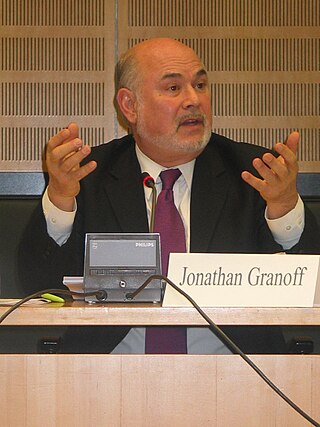Related Research Articles

The Comprehensive Nuclear-Test-Ban Treaty (CTBT) is a multilateral treaty to ban nuclear weapons test explosions and any other nuclear explosions, for both civilian and military purposes, in all environments. It was adopted by the United Nations General Assembly on 10 September 1996, but has not entered into force, as eight specific nations have not ratified the treaty.

The Treaty on the Non-Proliferation of Nuclear Weapons, commonly known as the Non-Proliferation Treaty or NPT, is an international treaty whose objective is to prevent the spread of nuclear weapons and weapons technology, to promote cooperation in the peaceful uses of nuclear energy, and to further the goal of achieving nuclear disarmament and general and complete disarmament. Between 1965 and 1968, the treaty was negotiated by the Eighteen Nation Committee on Disarmament, a United Nations-sponsored organization based in Geneva, Switzerland.

Nuclear proliferation is the spread of nuclear weapons, fissionable material, and weapons-applicable nuclear technology and information to nations not recognized as "Nuclear Weapon States" by the Treaty on the Non-Proliferation of Nuclear Weapons, commonly known as the Non-Proliferation Treaty or NPT. Proliferation has been opposed by many nations with and without nuclear weapons, as governments fear that more countries with nuclear weapons will increase the possibility of nuclear warfare, de-stabilize international or regional relations, or infringe upon the national sovereignty of nation states.

Nuclear disarmament is the act of reducing or eliminating nuclear weapons. Its end state can also be a nuclear-weapons-free world, in which nuclear weapons are completely eliminated. The term denuclearization is also used to describe the process leading to complete nuclear disarmament.
Arms control is a term for international restrictions upon the development, production, stockpiling, proliferation and usage of small arms, conventional weapons, and weapons of mass destruction. Historically, arms control may apply to melee weapons before the invention of firearm. Arms control is typically exercised through the use of diplomacy which seeks to impose such limitations upon consenting participants through international treaties and agreements, although it may also comprise efforts by a nation or group of nations to enforce limitations upon a non-consenting country.

The Conference on Disarmament (CD) is a multilateral disarmament forum established by the international community to negotiate arms control and disarmament agreements based at the Palais des Nations in Geneva. The Conference meets annually in three separate sessions in Geneva.

As the collapse of the Soviet Union appeared imminent, the United States and their NATO allies grew concerned of the risk of nuclear weapons held in the Soviet republics falling into enemy hands. The Cooperative Threat Reduction (CTR) program was initiated by the Nunn–Lugar Act, which was authored and cosponsored by Sens. Sam Nunn (D-GA) and Richard Lugar (R-IN). According to the CTR website, the purpose of the CTR Program was originally "to secure and dismantle weapons of mass destruction and their associated infrastructure in former Soviet Union states." As the peace dividend grew old, an alternative 2009 explanation of the program was "to secure and dismantle weapons of mass destruction in states of the former Soviet Union and beyond". The CTR program funds have been disbursed since 1997 by the Defense Threat Reduction Agency (DTRA).

Robert G. Joseph is a senior scholar at the National Institute for Public Policy. He was the United States Special Envoy for Nuclear Nonproliferation, with ambassadorial rank. Prior to this post, Joseph was the Under Secretary of State for Arms Control and International Security, a position he held until January 24, 2007. Joseph is known for being instrumental in creating the Proliferation Security Initiative and as the architect of the Global Initiative to Combat Nuclear Terrorism. He was also the US chief negotiator to Libya in 2003 who convinced the Libyans to give up their WMD programs. He also recently authored a book describing his experience in negotiating with Libya entitled "Countering WMD."
Joseph Cirincione (, SIR-in-see-OWN-ee is a national security analyst and author. He served as the president of the Ploughshares Fund, a public grant-making foundation focused on nuclear nonproliferation and conflict resolution.

Patricia Lewis is a British and Irish nuclear physicist and arms control expert, who is currently the Research Director for International Security at Chatham House. She is also currently Co-Director of the Global Commission on Internet Governance. She was previously the Senior Scientist-in-Residence and Deputy Director at the James Martin Center for Nonproliferation Studies at Monterey Institute of International Studies (MIIS). She was previously the Director of the United Nations Institute for Disarmament Research (UNIDIR) and the Director of VERTIC.

The Bureau of International Security and Nonproliferation (ISN) is a bureau within the United States Department of State responsible for managing a broad range of nonproliferation and counterproliferation functions. The bureau leads U.S. efforts to prevent the spread of weapons of mass destruction, their delivery systems, advanced conventional weapons, and related materials, technologies, and expertise.

Jonathan Granoff is an American lawyer, screenwriter and lecturer, widely known as President of the Global Security Institute.
National technical means of verification (NTM) are monitoring techniques, such as satellite photography, used to verify adherence to international treaties. The phrase first appeared, but was not detailed, in the Strategic Arms Limitation Treaty (SALT) between the US and USSR. At first, the phrase reflected a concern that the "Soviet Union could be particularly disturbed by public recognition of this capability [satellite photography]...which it has veiled.". In modern usage, the term covers a variety of monitoring technologies, including others used at the time of SALT I.

Ukraine, a republic of the former Union of Soviet Socialist Republics (USSR) from 1922–1991, once hosted Soviet nuclear weapons and delivery systems on its territory. Together with Russia, Ukraine was a part of the former Soviet Union but its population voted overwhelmingly for independence in 1991, which ended any realistic chance of the Soviet Union staying together even on a limited scale.
The 2010 Review Conference for the Treaty on the Non-Proliferation of Nuclear Weapons (NPT) was held at United Nations Headquarters in New York City from 3 to 28 May 2010. The President of the Review Conference is Ambassador Libran N. Cabactulan of the Philippines. UN Secretary-General Ban Ki-moon used the opening of the conference to note that "sixty five years later, the world still lives under the nuclear shadow".

Paula Adamo DeSutter was United States Assistant Secretary of State for Verification, Compliance, and Implementation from 2002 to 2009.

The Bureau of Arms Control, Deterrence, and Stability, formerly the Bureau of Arms Control, Verification and Compliance (AVC) is a bureau within the United States Department of State. It is responsible for providing oversight of policy and resources of all matters relating to the verification of compliance, or discovery of noncompliance, with international arms control, nonproliferation, and disarmament agreements.
Thomas Graham Jr. is a former senior U.S. diplomat. Graham was involved in the negotiation of every single international arms control and non-proliferation agreement from 1970 to 1997. This includes the Strategic Arms Limitation Talks, the Strategic Arms Reduction Treaties, the Anti-ballistic missile (ABM) Treaty, Intermediate-Range Nuclear Forces Treaty (INF) Treaty, Treaty on the Non-Proliferation of Nuclear Weapons Treaty (NPT), Treaty on Conventional Armed Forces in Europe (CFE) Treaty and Comprehensive Nuclear-Test-Ban Treaty (CTBT). In 1993, Ambassador Graham served as acting director of the Arms Control and Disarmament Agency (ACDA) from January to November, 1993 and Acting Deputy Director from November, 1993 to July, 1994. From 1994 through 1997, he was president Bill Clinton's special representative for Arms Control, Non-Proliferation, and Disarmament. Graham successfully led the U.S. government efforts to achieve the permanent extension of the NPT in 1995. Graham also served for 15 years as the general counsel of ACDA. Throughout his career, Thomas Graham has worked with six U.S. Presidents including Presidents Richard Nixon, Gerald Ford, Jimmy Carter, Ronald Reagan, George H. W. Bush, and Bill Clinton. Ambassador Graham worked on the negotiation of the Chemical Weapons Convention and the Biological Weapons Convention and managed the Senate approval of the ratification of the Geneva Protocol banning the use of chemical and biological weapons in war, as well as the Biological Weapons Convention.

Bonnie Denise Jenkins is an expert on arms control and nonproliferation of weapons of mass destruction and currently serves as the under secretary of state for arms control and international security affairs. During the Obama administration, she was the U.S. Department of State's coordinator for threat reduction programs in the Bureau of International Security and Nonproliferation.
References
- ↑ Ottaway, David B. (October 7, 1986). "State Dept. Unit to Monitor Soviet Disinformation". Washington Post.
- ↑ Schoen, Fletcher; Christopher Lamb. "Deception, Disinformation, and Strategic Communications: How One Interagency Group Made a Major Difference". Institute for National Strategic Studies. National Defense University. Retrieved 24 December 2018.
- ↑ "Documents" (PDF). insidethecoldwar.org.
- ↑ "Report on active measures" (PDF). jmw.typepad.com.
- ↑ "Soviet Influence, Sep 29 1987 - Video". C-SPAN.
- ↑ "Revenge in Kind". IMDb.
- ↑ Tang, Lisa (19 August 2021). "Bailey announces District 5 bid in 2022". Palestineherald.com. Retrieved 2021-08-25.
- ↑ "Data" (PDF). e-reports-ext.llnl.gov.
- ↑ "Archived copy" (PDF). Archived from the original (PDF) on 2016-01-29. Retrieved 2019-01-01.
{{cite web}}: CS1 maint: archived copy as title (link) - ↑ "CTBT update" (PDF). www.nipp.org. 2014.
- ↑ "Weapons" (PDF). www.nipp.org. 2014.
- ↑ "Protocol" (PDF). www.nipp.org. 2014.
- ↑ "Comprehensive Test Ban Treaty No Date.indd" (PDF). Retrieved 2019-01-18.